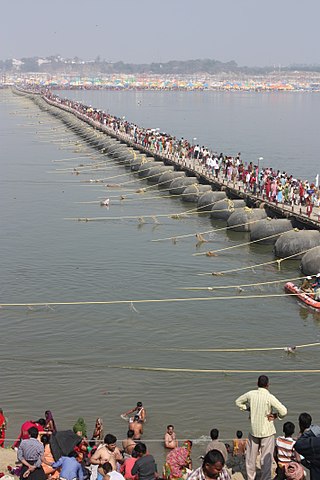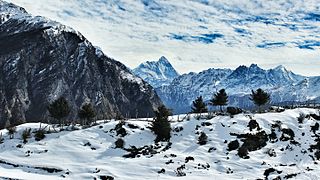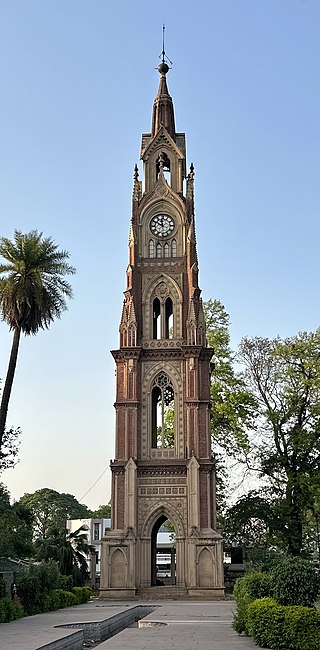
Haridwar is a city and municipal corporation in the Haridwar district of Uttarakhand, India. With a population of 228,832 in 2011, it is the second-largest city in the state and the largest in the district.

Kumbh Mela or Kumbha Mela is a major pilgrimage and festival in Hinduism. It is celebrated in a cycle of approximately 12 years, to celebrate every revolution Brihaspati (Jupiter) completes, at four river-bank pilgrimage sites: Prayagraj, Haridwar (Ganges), Nashik (Godavari), and Ujjain (Shipra). The festival is marked by a ritual dip in the waters, but it is also a celebration of community commerce with numerous fairs, education, religious discourses by saints, mass gatherings of monks, and entertainment. The seekers believe that bathing in these rivers is a means to prāyaścitta for past mistakes, and that it cleanses them of their sins.

Uttarakhand, formerly known as Uttaranchal, is a state in northern India. It is often referred to as the "Devbhumi" due to its religious significance and numerous Hindu temples and pilgrimage centres found throughout the state. Uttarakhand is known for the natural environment of the Himalayas, the Bhabar and the Terai regions. It borders the Tibet Autonomous Region of China to the north; the Sudurpashchim Province of Nepal to the east; the Indian states of Uttar Pradesh to the south and Himachal Pradesh to the west and north-west. The state is divided into two divisions, Garhwal and Kumaon, with a total of 13 districts. The winter capital and largest city of the state is Dehradun, which is also a railhead. On 5 March 2020, Bhararisain, a town in the Gairsain Tehsil of the Chamoli district, was declared as the summer capital of Uttarakhand. The High Court of the state is located in Nainital, but is to be moved to Haldwani in future.

Haridwar district also spelled as Hardwar is a district in Garhwal which is a part of Uttarakhand, India. It is headquartered at Haridwar which is also its largest city. The district is ringed by the districts Dehradun in the north and east, Pauri Garhwal in the east and the Uttar Pradesh districts of Muzaffarnagar and Bijnor in the south and Saharanpur in the west.

In Hinduism, the yatra (pilgrimage) to the tirthas has special significance for earning the punya needed to attain the moksha (salvation) by performing the darśana, the parikrama (circumambulation), the yajna, the Dhyana, the puja (worship), the prarthana, the dakshina, the seva, the bhandara, etc. These sacred places are usually located on the banks of sacred waters, such as sacred rivers or their tributaries, the kundas, the ghats, or the stepwells, or the temple tanks.

Yātrā, in Indian-origin religions, Hinduism, Buddhism, Jainism and Sikhism, generally means a pilgrimage to holy places such as confluences of sacred rivers, sacred mountains, places associated with Hindu epics such as the Mahabharata and Ramayana, and other sacred pilgrimage sites. Visiting a sacred place is believed by the pilgrim to purify the self and bring one closer to the divine. The journey itself is as important as the destination, and the hardships of travel serve as an act of devotion in themselves.
1954 Kumbh Mela "stampede" was a major crowd crush that occurred on 3 February 1954 at Kumbha Mela in Prayagraj in Uttar Pradesh state in India. It was the main bathing day of Mauni Amavasya, when the incident took place. 4–5 million pilgrims took part in the festival that year, which was also the first Kumbh Mela after India's Independence.

Har Ki Pauri, meaning the feet of Lord Vishnu (Hari), is a ghat on the banks of the river Ganga and landmark of the Hindu holy city of Haridwar in the Indian state of Uttarakhand.

The Sapta Puri are a group of seven Hindu tirtha, or holy pilgrimage sites, located in India. Pilgrimage to these sites is said to bless the pilgrim with moksha.

Maya Devi Temple, Haridwar is a Hindu temple dedicated to goddess Maya in the holy city of Haridwar of Uttarakhand state in India. It is believed that the heart and navel of goddess Sati fell in the region where the temple stands today and thus it is sometimes referred to as a Shakti Peetha.

Chandi Devi Temple, Haridwar is a Hindu temple dedicated to Goddess Chandi Devi in the holy city of Haridwar in the Uttarakhand state of India. The temple is situated atop the Neel Parvat on the Eastern summit of the Sivalik Hills, the southernmost mountain chain of the Himalayas. Chandi Devi Temple was built in 1929 by Suchat Singh in his reign as the King of Kashmir. However, the main murti of Chandi Devi at the temple is said to have been installed in the 8th century by Adi Shankaracharya, one of the greatest priests of Hindu religion. The temple also known as Neel Parvat Teerth is one of the Panch Tirth located within Haridwar.

Garhwal Kingdom was an independent Himalayan kingdom in the current north-western Himalayan state of Uttarakhand, India, founded in 688 CE by Kanak Pal, the progenitor of the Panwar dynasty that ruled over the kingdom uninterrupted until 1803 CE.
On 10 February 2013, during the Hindu festival of Kumbh Mela, a stampede broke out at the train station in Allahabad, Uttar Pradesh, India, killing 42 people and injuring at least 45 people.

The Kumbh Mela at Haridwar is a mela held every 12 years at Haridwar, India. The exact date is determined according to Hindu astrology: the Mela is held when Jupiter is in Aquarius and the Sun enters Aries.

The Prayag Kumbh Mela, also known as Allahabad Kumbh Mela is a mela, or religious gathering, associated with Hinduism and held in the city of Prayagraj, India, at the Triveni Sangam, the confluence of the Ganges, the Yamuna, and the mythical Sarasvati river. The festival is marked by a ritual dip in the waters, but it is also a celebration of community commerce with numerous fairs, education, religious discourses by saints, mass feedings of monks or the poor, and entertainment spectacle. Approximately 50 and 30 million people attended the Allahabad Ardh Kumbh Mela in 2019 and Maha Kumbh Mela in 2013 respectively to bathe in the holy river Ganges, making them the largest peaceful gathering events in the world.

Tirath Singh Rawat is an Indian politician, a sitting Member of Parliament and former Chief Minister of Uttarakhand. He was elected to the 17th Lok Sabha from the Garhwal constituency in the 2019 Indian general election as member of the Bharatiya Janata Party. He was the party chief of Bharatiya Janata Party Uttarakhand from 9 February 2013 to 31 December 2015 and former member of Uttarakhand Legislative Assembly from Chaubattakhal constituency from 2012 to 2017. He was also the first Education Minister of Uttarakhand.
The Gurdwara Gyan Godri Sahib, also known as Gurdwara Sri Gyan Godri Sahib, meaning "treasure of knowledge" was one of the holiest Gurdwara at Har Ki Pauri, Haridwar in the state of Uttarakhand, India. It existed at the place where The Bharat Scouts and Guides office exists today at the market in Subhash Ghat of Har Ki Pauri which is verified by Municipal Corporation Haridwar records of 1935.
Harshvardhan Kadam, also known as Inkbrushnme, is an artist from Pune, India, best known for illustrating children's books and painting mythological murals on walls across the world.

Aligarh Clock Tower, also known as the Harrison Tower, is a clock tower in Aligarh, India, situated near the Aligarh Muslim University. It was completed in 1893 and named for Aligarh's British civil servant of the Indian Civil Service (ICS) and district magistrate J. H. Harrison.

The clock tower at Meerut, India, also known as the Meerut Ghantaghar and Subhash Chandra Dwar, is a clock tower completed in 1914. It serves as a gateway between the market and Meerut City railway station.





















